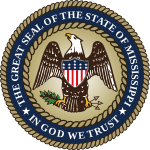Special election
A special election was held in Mississippi's at-large congressional district on July 11, 1826, to fill a vacancy caused by the death of Christopher Rankin (J) on March 14, 1826 [1]
| Elections in Mississippi |
|---|
 |
A special election was held in Mississippi's at-large congressional district on July 11, 1826, to fill a vacancy caused by the death of Christopher Rankin (J) on March 14, 1826 [1]
| Candidate | Party | Votes | Percent |
|---|---|---|---|
| William Haile | Jacksonian | 1,591 | 30.5% |
| John H. Norton | Unknown | 1,330 | 25.5% |
| Beverely R. Grayson [2] | Unknown | 1,212 | 23.2% |
| Adam L. Bingaman | Unknown | 1,089 | 20.9% |
| Source: Ourcampaigns.com | |||
Haile took his seat December 4, 1826 [1]

York was a constituency represented in the House of Commons of the Parliament of the United Kingdom until 2010. It elected two Members of Parliament (MPs) until 1918, and one thereafter by the first past the post system of election. From 1997 to 2010 it was known as City of York.

The 1826–27 United States House of Representatives elections were held on various dates in various states between July 3, 1826, and August 30, 1827. Each state set its own date for its elections to the House of Representatives before the first session of the 20th United States Congress convened on December 3, 1827. They occurred during John Quincy Adams's presidency. Elections were held for all 213 seats, representing 24 states.

Honiton was a parliamentary constituency centred on the town of Honiton in east Devon, formerly represented in the House of Commons of the Parliament of the United Kingdom. It sent members intermittently from 1300, consistently from 1640. It elected two Members of Parliament (MPs) until it was abolished in 1868. It was recreated in 1885 as a single-member constituency.

George Washington Bonaparte Towns was a United States lawyer, legislator, and politician. He served in the United States House of Representatives on three occasions and was the 39th Governor of Georgia from 1847 to 1851.

Nottingham was a parliamentary borough in Nottinghamshire, which elected two Members of Parliament (MPs) to the House of Commons from 1295. In 1885 the constituency was abolished and the city of Nottingham divided into three single-member constituencies.
William Baylies was an American lawyer and politician who served four non-consecutive terms as a U.S. Representative from Massachusetts in the early to mid-19th Century.

The 1826–27 United States Senate elections were held on various dates in various states. As these U.S. Senate elections were prior to the ratification of the Seventeenth Amendment in 1913, senators were chosen by state legislatures. Senators were elected over a wide range of time throughout 1826 and 1827, and a seat may have been filled months late or remained vacant due to legislative deadlock. In these elections, terms were up for the senators in Class 1.

Pennsylvania elected its members October 10, 1826.

On January 12, 1826, Patrick Farrelly (J) of Pennsylvania's 18th district died in office. A special election was held to fill the resulting vacancy

On May 1, 1826, Alexander Thomson (J) of Pennsylvania's 13th district resigned. A special election was held to fill the resulting vacancy on October 10, 1826, the same day as the general elections to the 20th Congress.

On August 14, 1826, Henry Wilson (J) of Pennsylvania's 7th district died. A special election was held to fill the resulting vacancy on October 10, 1826.

In the 1826 elections in Pennsylvania, a tie vote occurred in the 2nd district. As a result, no candidate won in that district and a special election was held on October 9, 1827.

Ohio elected its members October 10, 1826.

Kentucky elected its members August 6, 1827, after the term began but before the new Congress convened.

A special election was held in Maine's 5th congressional district was held on September 11, 1826 to fill a vacancy caused by the resignation of Enoch Lincoln (A) in January, having been elected Governor of Maine. As a majority was not achieved on the first ballot, a second election was held November 27.

A special election was held in North Carolina's 8th congressional district on November 3, 1826 to fill a vacancy caused by the resignation of Willie P. Mangum (J) on March 18, 1826

A special election was held in Ohio's 10th congressional district on October 10, 1826, the same day as the general elections for the 20th Congress, to fill a vacancy caused by the resignation of David Jennings (A) on May 25, 1826.
The 1826 United States elections occurred in the middle of Democratic-Republican President John Quincy Adams's term. Members of the 20th United States Congress were chosen in this election. The election took place during a transitional period between the First Party System and the Second Party System. With the Federalist Party no longer active as a major political party, the major split in Congress was between supporters of Adams and supporters of Andrew Jackson, who Adams had defeated in the 1824 Presidential election.

The 1826 Vermont gubernatorial election took place in September and October, and resulted in the election of Ezra Butler to a one-year term as governor.

The 1827 New Hampshire gubernatorial election was held on March 13, 1827.